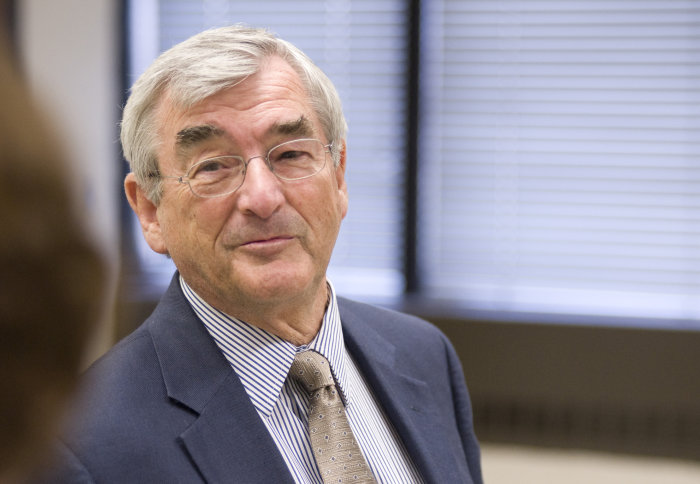Professor Alan Fenwick awarded the Dominique Kyelem Annual Prize
by Jack Stewart

Professor Alan Fenwick has been awarded the Dominuque Kyelem Annual Prize for lifetime achievement against Neglected Tropical Diseases.
Professor Alan Fenwick, Professor of Tropical Parasitology at Imperial’s School of Public Health and Founder of the Schistosomiasis Control Initiative, has been awarded the Dominique Kyelem Annual Prize for lifetime achievement against Neglected Tropical Diseases.
The award is given in honour of Dr Dominique Kyelem, a physician from Burkina Faso who became Programme Manager for the National Lymphatic Filiariasis Programme and then Program Director at the Task Force for Global Health in Atlanta Georgia who passed away in 2013 following a long battle with cancer.
The award was presented by the Coalition for Operational Research on NTDs (COR-NTD) at their annual conference in New Orleans.
Dr Eric Ottesen, Director of the Neglected Tropical Diseases Support Center, a programme of The Task Force for Global Health, said: “It’s thrilling to see Professor Fenwick recognized with the Kyelem Prize. Alan has been at the forefront of neglected tropical disease control for decades and is an acknowledged thought leader and founder not only of the modern NTD movement that began following the launch of the 2000 Millennium Development Goals but also of the Schistosomiasis Control Initiative (SCI).
“Since its inception in 2002 SCI’s growth and impact have been extraordinary, largely because it provides a unique blend of resources and support for program implementation, on-the-ground training and operational research for national schistosomiasis programs, now in 16 African countries. Alan has been a tireless advocate and fund-raiser for the NTDs, and his being awarded the Kyelem prize this year was an acknowledgement of the sincere admiration and appreciation our NTD community has both for him personally and for the many millions of people whose lives he has benefitted with the gift of better health.”
Following news of the award we asked Professor Fenwick a few questions about his career and the future of NTD research:
How does it feel to receive the Dominique Kyelem Annual Prize?
The announcement that I had been awarded this annual prize commemorating a very special person Dr Dominique Kyelem who passed away 6 years ago in his early 50’s but after a distinguished career in NTDs came as a surprise because I was not forewarned.
It is very special to be nominated by one’s peers and selected by a committee of one’s own peers.
As the award recognises lifetime achievement - what are you most proud of in your career?
The highlight of my career has been the success of SCI in growing from treating 10 million people a year in 6 countries in 2003 to treating 50 million people in 2017 in 16 countries. This has been made possible by grants from the Gates Foundation, USAID and DFID. But also by private donations from philanthropists around the world.
What do you see as the future challenges in the fight against NTDs?
This year both USAID and DFID have made new commitments of funding for treating NTDs supporting medicines donated on a massive scale by big Pharma. The challenge may be donor fatigue as we approach eliminating these diseases by treating one billion people every year free of charge against 10 NTDs.
What advice would you give to young researchers today at the start of their career?
Parasitology is a fascinating discipline to study and public health in the tropics still has a lot of room for improvement. Young researchers and doctors with a wish to travel can still find very rewarding work in the less developed countries of this world.
Article text (excluding photos or graphics) © Imperial College London.
Photos and graphics subject to third party copyright used with permission or © Imperial College London.
Reporter
Jack Stewart
School of Public Health